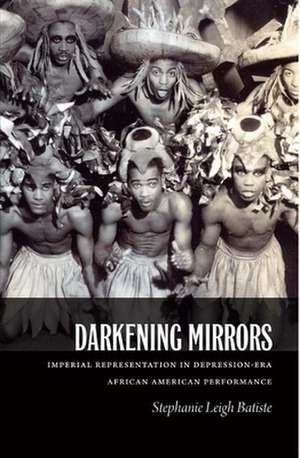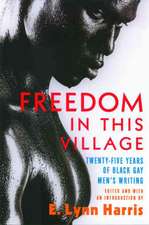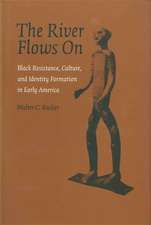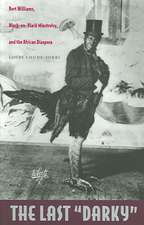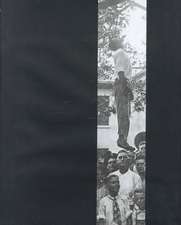Darkening Mirrors – Imperial Representation in Depression–Era African American Performance
Autor Stephanie Leigh Batisteen Limba Engleză Paperback – 5 ian 2012
Preț: 305.08 lei
Nou
Puncte Express: 458
Preț estimativ în valută:
58.38€ • 60.88$ • 48.52£
58.38€ • 60.88$ • 48.52£
Carte tipărită la comandă
Livrare economică 21 martie-04 aprilie
Preluare comenzi: 021 569.72.76
Specificații
ISBN-13: 9780822349235
ISBN-10: 082234923X
Pagini: 352
Ilustrații: 35 illustrations
Dimensiuni: 153 x 234 x 25 mm
Greutate: 0.59 kg
Editura: MD – Duke University Press
ISBN-10: 082234923X
Pagini: 352
Ilustrații: 35 illustrations
Dimensiuni: 153 x 234 x 25 mm
Greutate: 0.59 kg
Editura: MD – Duke University Press
Recenzii
In Darkening Mirrors, Stephanie Leigh Batiste rigorously explores black Americans complicity in imperialist discourse at the height of the Depression era. She makes an important, enlivening contribution to a growing body of scholarship examining some of the more complicated and ambiguous political affiliations of black cultural producers of the nineteenth century and early twentieth. This is a tremendously provocative study. - Daphne Brooks, author of Bodies in Dissent: Performing the Transatlantic Imaginary
Darkening Mirrors is a powerful argument that during the 1930s, African American popular performers took part in US imperial and nationalist projects even as they resisted the dominant cultures racism. In vivid, illuminating readings of films and stage showsfrom The Swing Mikado and the Federal Theater Projects voodoo Macbeth to Katherine Dunhams concert ballet LAgYaStephanie Leigh Batiste makes her case stick, and she makes it sting. At the same time, she writes beautifully about how black Americans asserted the genius of African and Afro-diasporic arts on the national and transnational scene. - Joseph Roach, Yale University
"Documents African-Americans' participation in U.S. Cultural imperialism on stage and screen; productions discussed include the Federal Theater Project's "voodoo" Macbeth." - Chronicle of Higher Education, March 19th 2012
Darkening Mirrors is a powerful argument that during the 1930s, African American popular performers took part in US imperial and nationalist projects even as they resisted the dominant cultures racism. In vivid, illuminating readings of films and stage showsfrom The Swing Mikado and the Federal Theater Projects voodoo Macbeth to Katherine Dunhams concert ballet LAgYaStephanie Leigh Batiste makes her case stick, and she makes it sting. At the same time, she writes beautifully about how black Americans asserted the genius of African and Afro-diasporic arts on the national and transnational scene. - Joseph Roach, Yale University
"Documents African-Americans' participation in U.S. Cultural imperialism on stage and screen; productions discussed include the Federal Theater Project's "voodoo" Macbeth." - Chronicle of Higher Education, March 19th 2012
Notă biografică
Cuprins
List of Figures ix
Prologue xi
Acknowledgments xix
Introduction 1
1. "Harlem Rides the Range": Expansion, Modernity, and Negro Success 27
2. Epaulets and Leaf Skirts, Warriors, and Subversives: Exoticism in the Performance of the Haitian Revolution 70
3. Prisms of Imperial Gaze: Swinging the Negro Mikado 115
4. Lens/Body: Anthropology's Methodologies and Spaces of Reflection in Dunham's Diaspora 165
5. Ethnographic Refraction: Exoticism and Diasporic Sisterhood in The Devil's Daughter 201
6. No Storm in the Weather: Domestic Bliss and African American Performance 228
Epilogue 256
Notes 261
Bibliography 299
Index 317
Prologue xi
Acknowledgments xix
Introduction 1
1. "Harlem Rides the Range": Expansion, Modernity, and Negro Success 27
2. Epaulets and Leaf Skirts, Warriors, and Subversives: Exoticism in the Performance of the Haitian Revolution 70
3. Prisms of Imperial Gaze: Swinging the Negro Mikado 115
4. Lens/Body: Anthropology's Methodologies and Spaces of Reflection in Dunham's Diaspora 165
5. Ethnographic Refraction: Exoticism and Diasporic Sisterhood in The Devil's Daughter 201
6. No Storm in the Weather: Domestic Bliss and African American Performance 228
Epilogue 256
Notes 261
Bibliography 299
Index 317
Descriere
In an important contribution to Black film and performance history, Stephanie Batiste looks back at Black stage and screen productions of the 1930s. This was a time when African Americans were expanding their interest in and solidarity with African and African diasporic people in other countries. Yet, in arts high and lowfrom the Voodoo Macbeth to the Swing Mikado, in Katherine Dunhams films, and Black westernspeople of color from Africa, the Caribbean, and Asia, were portrayed in exoticizing ways. Despite being treated as second class citizens in the U.S., African American productions reproduced the dominant national sense of imperial superiority over people of color elsewhere, which leads Batiste to argue for a more complex view of Black agency and national identity in the period.
